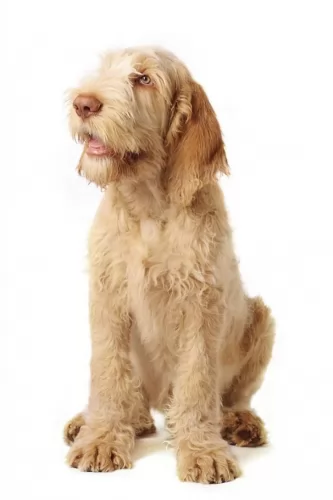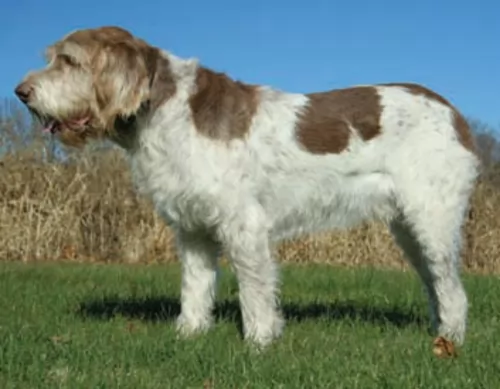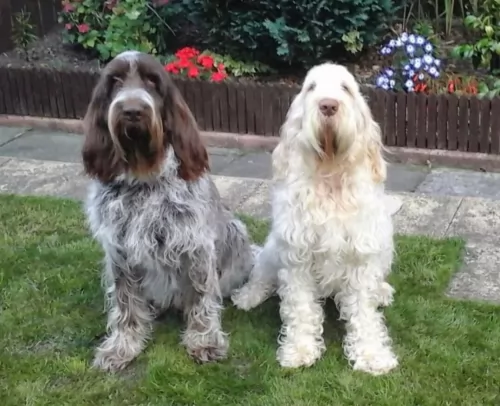 Petzlover
Petzlover Hellenic Hound is originated from Greece but Spinone Italiano is originated from Italy. Hellenic Hound may grow 15 cm / 5 inches shorter than Spinone Italiano. Hellenic Hound may weigh 19 kg / 41 pounds lesser than Spinone Italiano. Hellenic Hound may live 3 years more than Spinone Italiano. Hellenic Hound may have less litter size than Spinone Italiano. Hellenic Hound requires Low Maintenance. But Spinone Italiano requires Moderate Maintenance
Hellenic Hound is originated from Greece but Spinone Italiano is originated from Italy. Hellenic Hound may grow 15 cm / 5 inches shorter than Spinone Italiano. Hellenic Hound may weigh 19 kg / 41 pounds lesser than Spinone Italiano. Hellenic Hound may live 3 years more than Spinone Italiano. Hellenic Hound may have less litter size than Spinone Italiano. Hellenic Hound requires Low Maintenance. But Spinone Italiano requires Moderate Maintenance
 Developed in Southern Greece, the Hellenic Hound was bred to hunt hare and is an ancient breed. It is a medium sized breed with strong scent and tracking skills. It is believed to have been in existence for thousands of years. The ancestry of the breed included the Lagonikoi or laconikoi, native to southern Greece in ancient times. The breed was spread by sailors on Greece trading ships and colonization.
Developed in Southern Greece, the Hellenic Hound was bred to hunt hare and is an ancient breed. It is a medium sized breed with strong scent and tracking skills. It is believed to have been in existence for thousands of years. The ancestry of the breed included the Lagonikoi or laconikoi, native to southern Greece in ancient times. The breed was spread by sailors on Greece trading ships and colonization.
Todays Hellenic Hound is found throughout Europe. Kept somewhat isolated by the mountains, the breed was protected from outside breeding and they remained pure for centuries. It is a fearless, smart and hyped up purebred. The Hellenic Hound needs to have a job and if you don’t give him one, he will find one. He is smart and independent which sometimes makes him stubborn. It also takes this dog longer to mature than others, sometime between two and three years. It is not good for first time owners. Today’s hound is still a popular hunting dog and companion animal as well. They are rarely seen outside of the Greek country.
In 1996 the Hellenic Hound was recognized as the first Greek dog breed into the FCI. They are not recognized by the AKC. Its numbers continue to decline.
 This Italian breed has an ancient blood line tracing all the back to 500 BC. Originally bred to hunt, he is today a friendly, alert and loyal companion. He is intelligent enough to do any job you give him. The Spinone is thought to be one of the oldest gun dogs ever, but it is not entirely clear that he came from Italy. There are some who think he may have come from somewhere in these European countries – Italy, Greece, France, Celtic Ireland, Spain or Russia. However, most believe the breed came from Italy in the Piedmont area.
This Italian breed has an ancient blood line tracing all the back to 500 BC. Originally bred to hunt, he is today a friendly, alert and loyal companion. He is intelligent enough to do any job you give him. The Spinone is thought to be one of the oldest gun dogs ever, but it is not entirely clear that he came from Italy. There are some who think he may have come from somewhere in these European countries – Italy, Greece, France, Celtic Ireland, Spain or Russia. However, most believe the breed came from Italy in the Piedmont area.
The most common thinking is that he is a descendent of the Spanish Pointer and/or the Russian Setter. One other theory is that setters from Greece were brought to the Roman Empire and crossed with a variety of Italian dog to make the coarse haired Spinone we see today. Then the French put in their claim that the breed is a cross of many French pointers.
The theory that counts might just belong to the Italians who believe the ancestor to the Spinone includes the German Wirehaired Pointer, the Pudelpointer and the Wirehaired Pointer. It was not until the 19th century that the name Spinone was officially given to the breed.
Before that it might have been known as a Spinoso and named after a thorn bus in Italy called the Spino. This bush was so thick and sharp that small prey animals learned to hide under it because the predators could not get through it. The Spinone however was able to fight through the briars with its thick, coarse hair and tough skin.
The breed almost became extinct during the second world war as before and after the hunters in Italy had started to use other breeds for hunting. Breeders also began to cross the Spinone with wire hairs like German Wirehaired Pointer, the Wirehaired Pointing Griffon and the Boulet.
The most popular hunting dog in Italy today is the Bracco Italiano while the Spinone is still used for hunting.
 Today’s Hellenic Hound is not a big dog but rather very average or medium. It is an athletic dog and looks like it. It has a balanced body with a deep chest and thick neck. It has medium height legs that are strong and muscular with paws that are prepared for the terrain it always works on. Its coat is short and tight. The colors of the Hellenic Hound are black with tan or white on the chest. Their heads are noble and rounded with a rectangle shaped muzzle. They have v shaped, long ears and round eyes. Their toe nails are black and so is their nose. It has excellent scent glands, very quick responses, speed and stamina. Their tail is thick and tapers off.
Today’s Hellenic Hound is not a big dog but rather very average or medium. It is an athletic dog and looks like it. It has a balanced body with a deep chest and thick neck. It has medium height legs that are strong and muscular with paws that are prepared for the terrain it always works on. Its coat is short and tight. The colors of the Hellenic Hound are black with tan or white on the chest. Their heads are noble and rounded with a rectangle shaped muzzle. They have v shaped, long ears and round eyes. Their toe nails are black and so is their nose. It has excellent scent glands, very quick responses, speed and stamina. Their tail is thick and tapers off.
 The breed is made up of strong, solid and muscled dogs that have an almost square build. His legs are made to travel any terrain and his head is long with an occipital that is pronounced and unique to the Spinone. They are said to have “human appearing eyes”, with a docked tail in countries allowing it and webbed paws.
The breed is made up of strong, solid and muscled dogs that have an almost square build. His legs are made to travel any terrain and his head is long with an occipital that is pronounced and unique to the Spinone. They are said to have “human appearing eyes”, with a docked tail in countries allowing it and webbed paws.
Shorter hair covers their feet, head, legs, muzzle and ears. They have longer hair on their eyebrows and it is stiff, with soft hair on the muzzle and cheeks with a beard and mustache. It is a single coated dog though the coat is rough. They should have skin, lips, nose, and pads in colors that coordinate with their coats. For white dog it is a red-orange color, brown in dogs that are roan colored and dark red-orange in the orange and white colored dog.
 yes, they are very fond of children as long as they are carefully socialized.
yes, they are very fond of children as long as they are carefully socialized.
Great hunter, stamina ,scent, voice
He needs to have a yard or land. He doesn’t do well in apartments.
The breed is very intelligent and can be very trainable. However, they can also be stubborn and that makes training harder.
 3.Adaptability – Young dogs need a lot of attention but they don’t need a lot of space. The young dogs are energetic while the adult dogs are laid-back. They need exercise every day and at least a small back yard.
3.Adaptability – Young dogs need a lot of attention but they don’t need a lot of space. The young dogs are energetic while the adult dogs are laid-back. They need exercise every day and at least a small back yard.
 The Hellenic Hound is a fairly healthy breed having been isolated on the Island of Greece for the most part. They are susceptible to:
The Hellenic Hound is a fairly healthy breed having been isolated on the Island of Greece for the most part. They are susceptible to:
Could be hips, elbows or knees. If untreated can lead to lameness or inability to walk.
Causes joint pain and can cause lameness or inability to walk.
Can be fatal if not treated immediately. To avoid it don’t feed a large meal before or after exercise.
Can be a variety of things that occur during the hunt.
Need to keep the ears clean and dry in order to avoid infections.
 This is an ancient breed with not a lot of documented genetic issues, but it does have one deadly condition.
This is an ancient breed with not a lot of documented genetic issues, but it does have one deadly condition.
• Cerebellar ataxia (CA) is inherited and hits the puppies. Because it is a recessive gene both the mother and father must carry it for the puppy to inherit it. This makes it less likely than it would be otherwise. Puppies with the condition do not live more than a year. Since it is a genetic problem there is now a test for it that identifies carriers at a 95% accuracy rate.
• Like many other large breed dogs, they are susceptible to hip dysplasia. This can cause arthritis and/or lameness. There are now hip replacement surgeries available for this condition.
• Bloat is again common in large dogs and you need to watch for it with the Spinone. It can be deadly if not treated immediately. Let your dog rest quietly after eating. Do not let her exercise or play energetically after eating.
 Feed the puppy 2-3 times a day a total of 2 cups
Feed the puppy 2-3 times a day a total of 2 cups
Feed the adult twice a day a total of 2-3 cups
The Hellenic Hound has excellent stamina, speed and scenting ability.
This is a very active, athletic dog that needs to work and needs exercise. He is powerful, quick and has great endurance. It thrives on hunting but will need other activities on the days it doesn’t hunt. It needs a yard or land to play in. Agility, Field Trials, tracking, hunting and fly ball are all activities the Hellenic Hound will enjoy.
 1Feeding the puppy – feed a high quality dog food for puppies of large breeds. Feed 3-4x day but don’t overfeed or let him exercise after eating even as a puppy.
1Feeding the puppy – feed a high quality dog food for puppies of large breeds. Feed 3-4x day but don’t overfeed or let him exercise after eating even as a puppy.
2.Feeding the adult - feed a high quality dog food for large breeds. Feed 1-2X day but don’t overfeed or let him exercise after eating.
4. Games and Exercises – The Spinone is an active breed, but not a fast dog. In fact, they like to travel at a trot so it becomes a great dog for jogging or running with. They love to jump, track, hunt, hike. They do well with agility, retrieving, flyball, carting, being a therapy dog, a rescue dog and a watchdog.